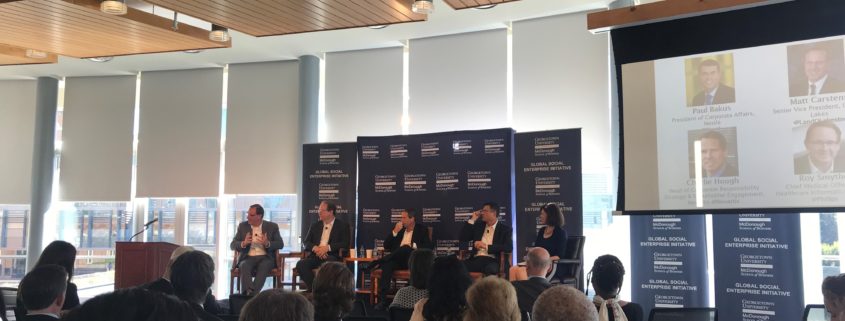Seeking to “Change the World?” Tips for Responsible Companies
By Bridget Pooley and Hannah Lee
Consumers are increasingly making purchasing decisions based on sustainability values, driving companies to rethink their social responsibility initiatives. Sixty-six percent of consumers say they are willing to pay more for sustainable brands—in comparison to fifty-five percent in 2014.[1] While consumers have the power to hold companies accountable in a short-term purchasing decisions, many consumers do not recognize they have the power to influence companies in long-term, sustainable change within communities.
The expectation of companies to be socially responsible does not stop with consumers, we know that it also drives talent acquisition and employee retention. Research shows that sixty-four percent of millennials will not accept a job with a company that does not have strong corporate social responsibility values.[2]
For the past three years, Forbes has made an effort to highlight socially responsible corporations through a list of “50 companies changing the world”. Last month, Georgetown University’s McDonough School of Business’ Global Social Enterprise Initiative (GSEI) hosted “Change the World,” an event featuring the executives from companies who were recognized on Fortune’s 2017 “Change the World” list.
We took away two key insights for companies who are seeking to “change the world:”
- Balance the Short-Term and Long-Term Impacts of Corporate Social Responsibility
The corporate executives we heard from were consistent in stating that companies must consider balancing short-term pressures while trying to implement corporate sustainability practices that often focus on long-term outcome. Even though it can be difficult, it is also very worthwhile. For example, when Walmart announced a company-wide increase of its minimum wage to $9/hour based on consumer behavior and employee feedback, Walmart’s stock fell 30 percent. Walmart held steady on the decision, viewing the new policy as a long-term investment in their employees. In the two years since the wage increase, Walmart has been able to build a healthier, more productive workforce and its stock value has continued to grow.
For companies like Walmart, staying focused on the long-term meant working through short-term challenges and compromises with board members and investors. Yet, the goal of corporate social responsibility efforts is often to create long-term gains. By investing in their employee base, Walmart was able to demonstrate its commitment to the workforce and community, winning over new employees and customers alike. Sharing this success story has allowed Walmart to rebuild trust within communities, ultimately helping their bottom line.
- Tell your Corporate Social Responsibility Story
In a recent study, eighty-one percent of millennials indicated they expect their favorite companies to make public declarations of corporate citizenship.[3] By sharing stories of impact, companies are able to attract top talent, provide thought leadership within their industry, and garner more community support, leading to a broader, and more loyal customer base. Being socially responsibly is no longer an option, it is necessary to build the trust of consumers and employees in order to increase business bottom line. But for some companies, the instinct is to tell the story of their products and services, and not necessarily their CSR.
Fortune highlighted how important it is for companies to tell their corporate social responsibility stories to their customers and workforce. The first year Fortune invited companies to share their social impact stories, there was little interest in being featured. Just three years later, Fortune is inundated with companies applying the moment the application period opens. While Fortune is a reputable publication and any company would appreciate coverage, these companies understand the power of sharing their social impact narrative, similar to the story Walmart shared.
At Mission Partners, we know CSR is no longer optional—it is expected by employees, customers, and stakeholders. We work every day to guide high-potential nonprofits, foundations, and purpose-driven corporations in moving their missions forward. And, we understand the power of thinking long-term and telling your CSR story. We’ve love to hear what your experience has been. How do you tell your CSR story? How have you succeed in making the case for prioritizing long-term gains? Drop us a line and let us know what you think: [email protected] and [email protected].
[1] “The Sustainability Imperative: New Insights on Consumer Expectations”. Nielsen. October 2015.
[2] “Cone Communications CSR Study”. Cone Communications. 2017.
[3] Ibid.





 Check out our new
Check out our new